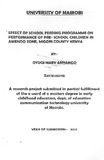| dc.description.abstract | This study was undertaken to create an understanding of interplay between school feeding programme in performance in pre-schools. It sought to demonstrate how various aspects of nutrition affect the performance of pre-schoolers. At the end it offered perspective on how the various nutrition programmes would be reconciled for the total benefit of pre-schoolers.
In respect pre-school feeding programmes were seen as key and a sufficient contribution towards attainment of high enrolment, regular school attendance and reduction of dropout rates as well as enhancing the pupil capacity to concentrate in school activities. Lack of well coordinated school feeding programme in Awendo Zone were some of the reasons that presented the need for the study. The overriding assumption in this area was that most pre-schoolers spent half day in centres and their nutritional needs would be met within their homes, which left the feeding programme in a pathetic state. As a result the quality of food and resources meant to sustain these programme was not given a lot of weight it deserved.
The research into this problem was carried out in Awendo Zone Migori County. Data was gathered by use of interview schedules, questionnaires and observation checklist which enabled the researcher to assess the quality of school feeding programme resources. A pilot-test of the research instruments proceeded to test the validity and reliability of these instruments covering six pre-school using purposive sampling procedure. This was later followed by a study which targeted 6 pre-schools Headteachers, 6 teachers, 12 parents, 12 children totaling to a matrix of 36 sample population.
Analysis of data took both qualitative and quantitative forms which triggered the use of tables, graphs and charts which facilitated easy interpretation of data. This study confirmed that pre-school feeding programme was highly sponsored by parents. Facilities and equipments used were inadequate and some were unsustainable for young children. Very low quality foods were given. This affected pupil achievements in most centres. | en_US |

